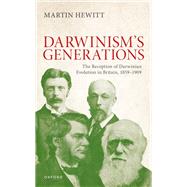The Reception of Darwinian Evolution in Britain, 1859-1909 Darwinism's Generations
, by Hewitt, Martin- ISBN: 9780192890993 | 0192890999
- Cover: Hardcover
- Copyright: 12/12/2024
The Reception of Darwinian Evolution in Britain, 1859-1909: Darwinism's Generations uses the impact of Charles Darwin's On the Origin of Species (1859) in the 50 years after its publication to demonstrate the effectiveness of a generational framework for understanding the cultural and intellectual history of Britain in the nineteenth century. It challenges conventional notions of the 'Darwinian Revolution' by examining how people from across all sections of society actually responded to Darwin's writings. Drawing on the opinions and interventions of over 2,000 Victorians, drawn from an exceptionally wide range of archival and printed sources, it argues that the spread of Darwinian belief was slower, more complicated, more stratified by age, and ultimately shaped far more powerfully by divergent generational responses, than has previously been recognised. In doing so, it makes a number of important contributions. It offers by far the richest and most comprehensive account to date of how contemporaries came to terms with the intellectual and emotional shocks of evolutionary theory. It makes a compelling case for taking proper account of age as a fundamental historical dynamic, and for the powerful generational patternings of the effects that age produced. It demonstrates the extent to which the most common sub-periodisation of the Victorian period are best understood not merely as constituted by the exigencies of events, but are also formed by the shifting balance generational influence.
Taken together these insights present a significant challenge to the ways historians currently approach the task of describing the nature and experience of historical change, and have fundamental implications for our current conceptions of the shape and pace of historical time.
Taken together these insights present a significant challenge to the ways historians currently approach the task of describing the nature and experience of historical change, and have fundamental implications for our current conceptions of the shape and pace of historical time.






